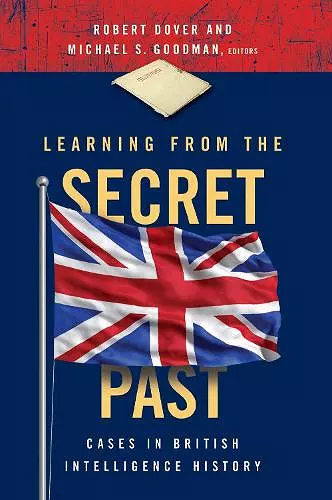Learning from the Secret Past
Cases in British Intelligence History
Robert Dover editor Michael S Goodman editor
Format:Paperback
Publisher:Georgetown University Press
Published:4th Nov '11
Currently unavailable, and unfortunately no date known when it will be back

All professions, maybe especially the intelligence profession, must be aware of and learn from their history. British Intelligence has been a major player throughout the past one hundred years. There are important lessons to be drawn from their varied experiences as set down in this often thought-provoking study. -- Sir John Scarlett, former chairman of the British Joint Intelligence Committee and former chief of the British Secret Intelligence Service (MI6) Learning from the Secret Past is an admirably executed combination of important case studies, apt primary-source material, and illuminating analysis. Each example has clear contemporary relevance and I commend the book to policymakers and scholars, as well as to anyone interested in the myriad significant ways intelligence has impinged on modern British history and politics. -- Keith Jeffery, Queen's University Belfast, and author of MI6: The History of the Secret Intelligence Service, 1909-1949
A collection of ten carefully selected cases from post-World War II British intelligence history that include: the Malayan Emergency, the Cuban Missile Crisis, Northern Ireland, and the lead up to the Iraq War.Identifying "lessons learned" is not new - the military has been doing it for decades. However, members of the worldwide intelligence community have been slow to extract wider lessons gathered from the past and apply them to contemporary challenges. "Learning from the Secret Past" is a collection of ten carefully selected cases from post-World War II British intelligence history. Some of the cases include the Malayan Emergency, the Cuban Missile Crisis, Northern Ireland, and the lead up to the Iraq War. Each case, accompanied by authentic documents, illuminates important lessons that today's intelligence officers and policymakers - in Britain and elsewhere - should heed. Written by former and current intelligence officers, high-ranking government officials, and scholars, the case studies in this book detail intelligence successes and failures, discuss effective structuring of the intelligence community, examine the effective use of intelligence in counterinsurgency, explore the ethical dilemmas and practical gains of interrogation, and highlight the value of human intelligence and the dangers of the politicization of intelligence. The lessons learned from this book stress the value of past experience and point the way toward running effective intelligence agencies in a democratic society. Scholars and professionals worldwide who specialize in intelligence, defense and security studies, and international relations will find this book to be extremely valuable.
The range of documents throughout the volume is impressive, including a parliamentary debate, Joint Intelligence Committee reports, a transcription of a secret meeting between agents and a military directive. By integrating these fascinating sources with perceptive historical analysis, this book makes a strong case for the desirability of studying the past. International Affairs This is a book that any serious student of British intelligence activity will want to read and read again. British Politics Group Newsletter Dover and Goodman have made a substantial and timely contribution to the American and British intelligence communities on aspects of the importance of creating a process to identify lessons learned, similar to the process used by the military, in spite of the difficulty of drawing lessons from intelligence because most successes go unreported due to the nature of the trade, and failures are analyzed by outsiders who must judge what they are not allowed to observe. International Journal of Intelligence Ethics
ISBN: 9781589017702
Dimensions: unknown
Weight: 431g
288 pages